Key takeaways:
- Understanding cryptocurrency introduces kids to the evolving digital world, encouraging them to learn about new financial systems.
- Securing crypto assets is essential to prevent losses from scams and hacking, emphasizing strong passwords and two-factor authentication.
- Using hardware wallets and password managers greatly enhances the security of digital assets, providing control and peace of mind.
- Staying informed about common scams and practicing vigilance in online interactions are crucial for protecting investments.
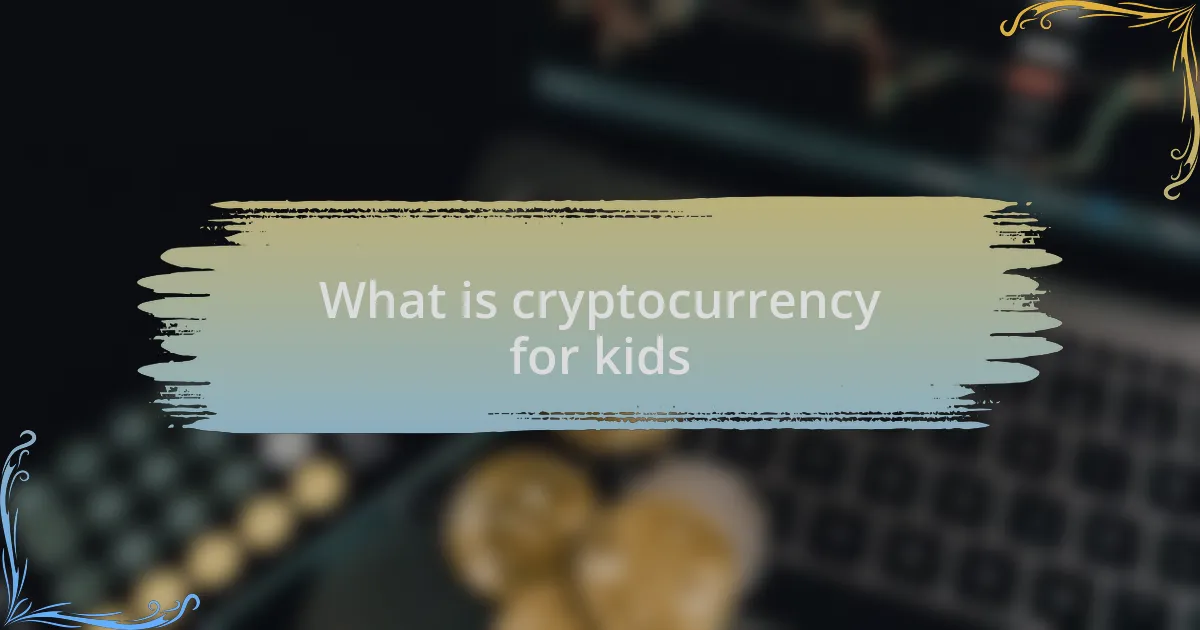
What is cryptocurrency for kids
Cryptocurrency is like digital money that lives on the internet. It can be used to buy things online, but rather than being controlled by banks, it’s managed by a network of computers all over the world. When I first heard about Bitcoin, I was fascinated that something so different from traditional cash could exist.
Imagine having a special kind of money that doesn’t need physical coins or bills. That’s what intrigued me as a kid—this idea that you could own a piece of digital currency just by understanding how it works. I remember feeling excited at the thought of trading stickers with friends, but this was a much bigger game with unlimited possibilities.
So, why should kids care about cryptocurrency? Well, it’s not just about money; it’s about being part of a growing digital world. Learning about crypto can give kids an edge, like understanding the rules of a game nobody is paying attention to yet. I often think about how my younger self would have loved to dive into this adventure. Wouldn’t you want to show kids that money can evolve?
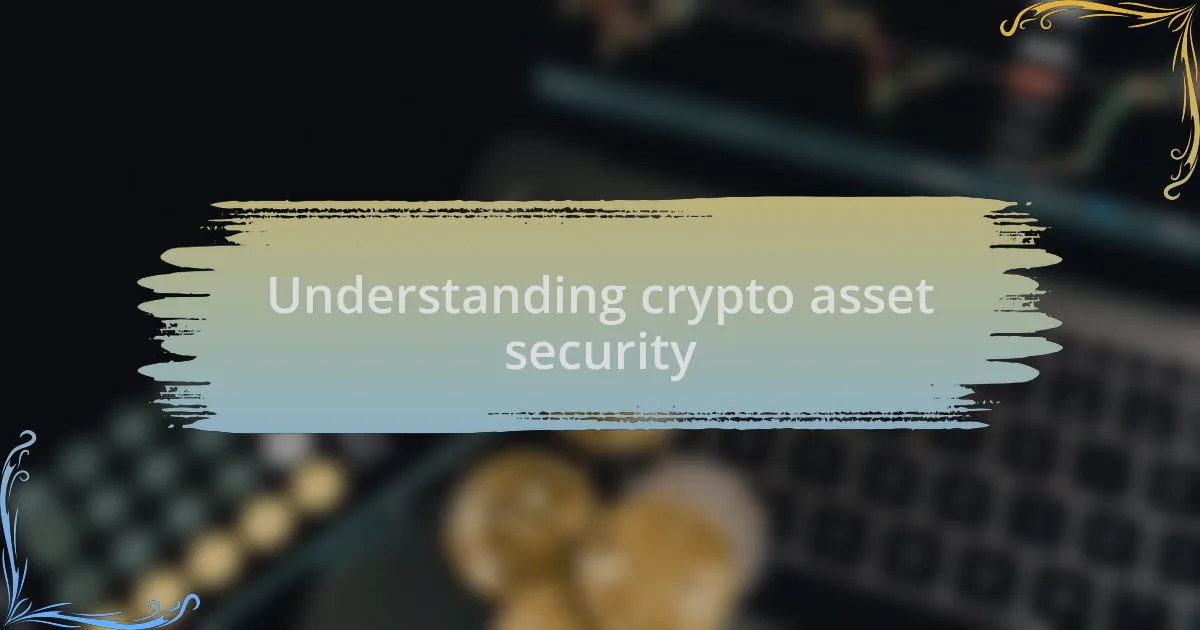
Understanding crypto asset security
Understanding crypto asset security is essential in today’s digital age, especially for young enthusiasts. When I first started exploring cryptocurrencies, I quickly realized that securing my digital assets was as important as understanding how to trade them. I remember the anxiety I felt when I heard stories about people losing their funds due to hacking and scams. It made me double-check every password and look into how wallets work.
There are different types of wallets, and knowing which one to use can make a huge difference. I opted for a hardware wallet, which feels like having a solid lock on a digital treasure chest. It keeps my coins offline, away from hackers who lurk on the internet. And trust me, the peace of mind that comes with seeing my investments safely tucked away is irreplaceable.
In my experience, two-factor authentication (2FA) is a must-have. It reminds me of having an extra key for my locker—it’s just smart. Whenever I log into my exchange, I feel a sense of security knowing that even if someone guessed my password, they would still need that second step to get in. How would you feel knowing that you took extra steps to protect something valuable? Understanding these measures not only empowers us but also encourages a sense of responsibility in handling digital assets.
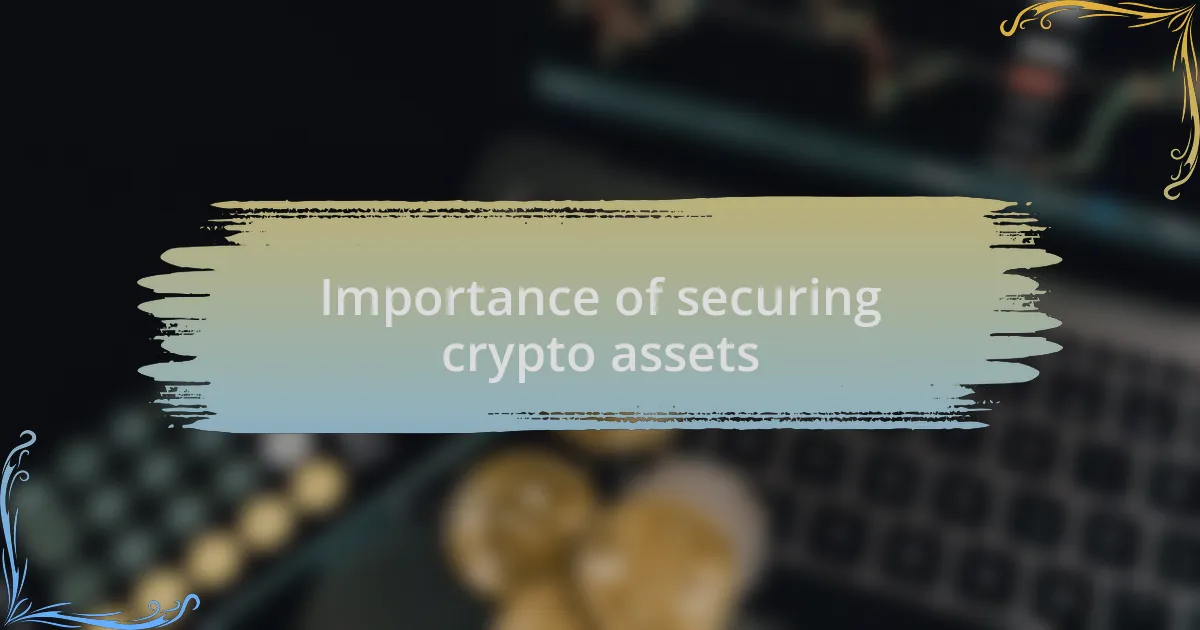
Importance of securing crypto assets
Securing crypto assets isn’t just a precaution; it’s a necessity that can prevent heartaches. I vividly remember a friend who lost a significant amount in a phishing scam because he didn’t take security seriously. It was a tough lesson, watching someone’s enthusiasm for crypto turn into frustration and loss. Have you ever thought about how easily something you cherish can slip away if you’re not careful?
For me, using strong passwords felt like building a fortress around my crypto investments. When I learned how common it was for wallets to be hacked, it dawned on me: a weak password was like leaving the front door wide open. I started using a password manager, not only to store my passwords but also to generate complex combinations that are hard to crack. It might seem tedious, but the extra effort protects what I’ve worked hard to earn. Gratitude washed over me every time I realized I took proactive steps instead of reactive ones.
Moreover, educating myself on scams has been invaluable. After hearing stories of people losing their assets due to misinformation, I made it my mission to stay informed. It’s like learning to navigate a new city; knowing the right paths can keep you safe from getting lost. Each article I read and each forum I followed sharpened my instincts—helping me identify red flags in offers that seemed too good to be true. Engaging with the community also supported my learning; are you finding ways to do the same?
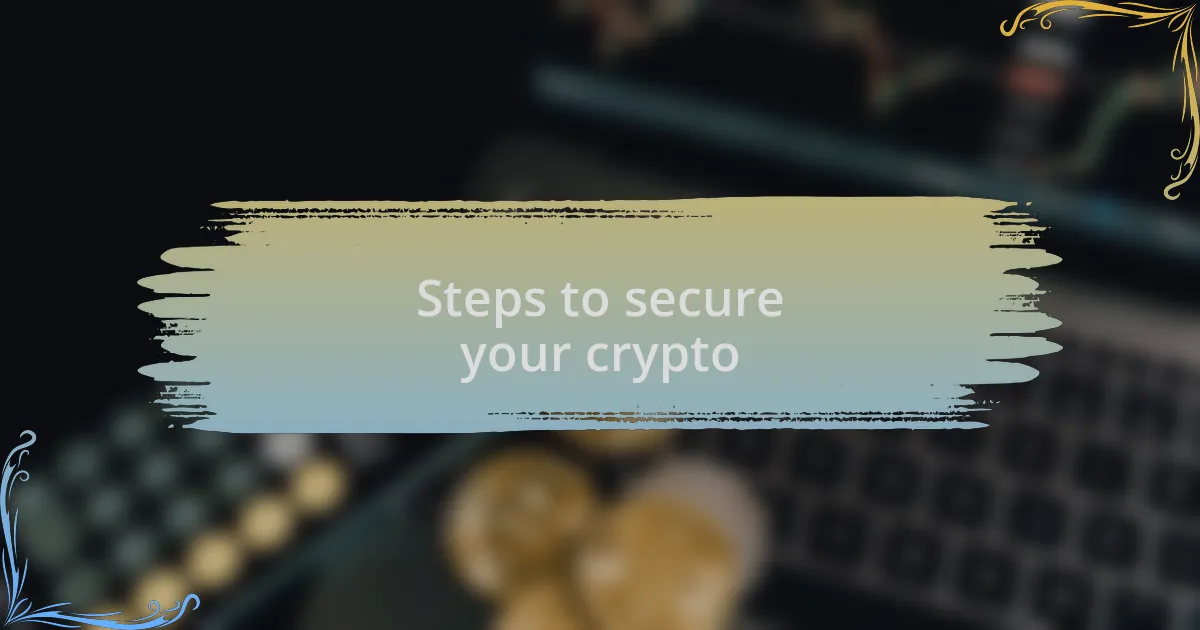
Steps to secure your crypto
To secure my crypto assets, the first step I took was enabling two-factor authentication (2FA). This added layer of security made me feel like I had reinforced my vault; even if someone got my password, they still needed that second key. It’s like having a double lock on your front door—no one is getting in without both combinations.
Next, I became a diligent observer of my wallets. I remember one time I checked my balances and noticed an unexpected transaction. It turned out to be a minor error, but it was a wake-up call about the importance of regular monitoring. Keeping an eye on my assets not only helped catch potential issues early but also allowed me to stay connected with my investments.
Finally, I made the conscious choice to store most of my crypto in cold wallets. The first time I transferred my assets off exchanges felt like a right of passage. It’s akin to putting your valuables in a safe instead of leaving them out in the open. Have you considered how much safer your crypto might be away from the daily hustle and bustle of online platforms? This shift in strategy provided me peace of mind and reduced the anxiety of potential hacks.
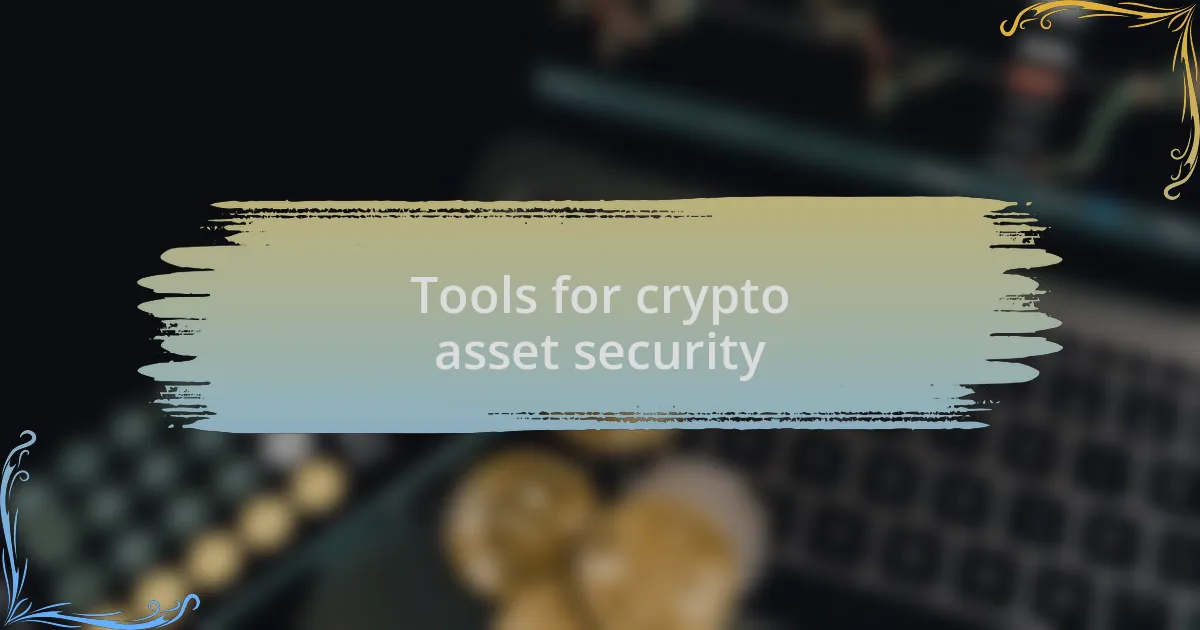
Tools for crypto asset security
When it comes to tools for securing crypto assets, a hardware wallet is my go-to choice. I remember the first time I set one up; it felt like I was creating my own digital fortress. Having my private keys stored offline gave me a sense of control that online platforms simply couldn’t provide. It made me realize that investing in a hardware wallet was not just a decision, but a commitment to protecting my financial future.
I’ve also experimented with different password managers to keep my passwords safe. Using a password manager felt like having a digital assistant that locked up my most sensitive information. It wasn’t just about convenience; it was about ensuring that I used strong, unique passwords for every account. Have you ever tried using a password manager? I can’t stress enough how much peace of mind it brought me, knowing that my password safety was in such capable hands.
Another vital tool I’ve utilized is secure backup options for my seed phrases. I can’t emphasize enough how crucial it is to keep these safe. I once lost a physical note with my seed phrase briefly and the panic that set in was indescribable. That experience taught me the importance of redundancy—I now store copies in different secure locations. It’s like creating multiple escape routes in case of an emergency; you want to be prepared! How have you secured your recovery phrases?
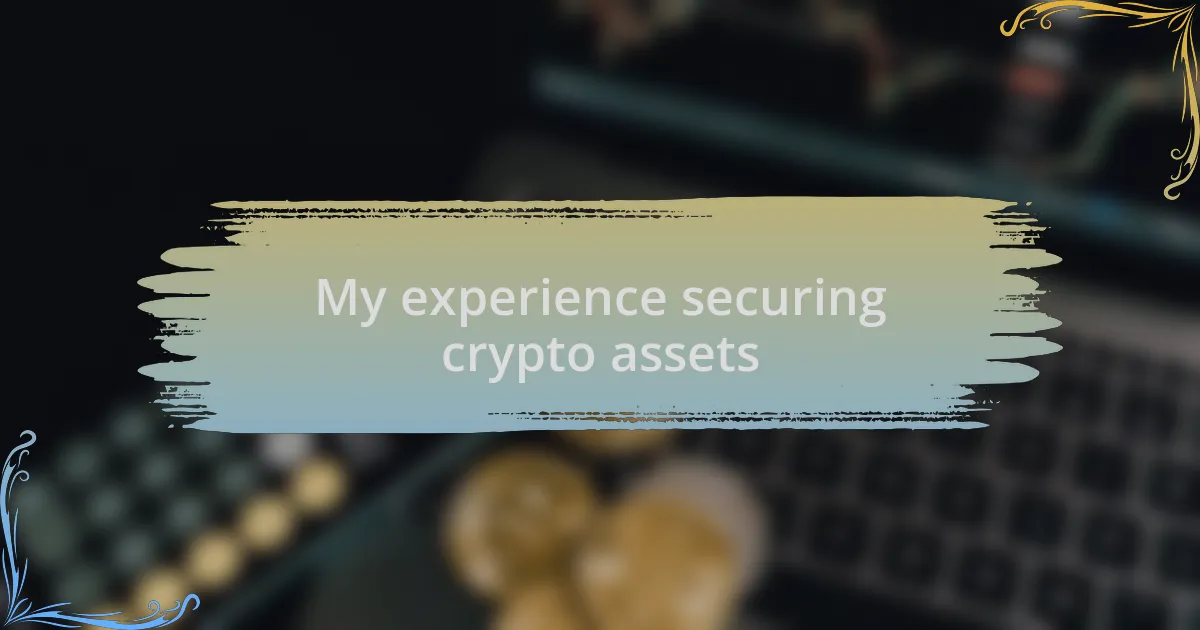
My experience securing crypto assets
While exploring ways to secure my crypto assets, I always kept an eye on multi-factor authentication (MFA). The first time I set it up on my accounts, it felt like adding an invincible lock to my digital doors. Have you ever experienced that extra layer of security? For me, that little hassle of entering a code sent to my phone or email was a small price to pay for the immense peace it brought.
I also recall a time when I decided to join a local crypto community. During a discussion, someone shared their dramatic story of losing funds due to a phishing attempt. Hearing that tale made my heart race, and I realized how crucial it was to be vigilant. I began to educate myself further, attending webinars and reading articles that highlighted common scams. I learned firsthand the value of being informed and proactive rather than reactive, and that knowledge has become a cornerstone of my security strategy.
Another lesson hit me hard when I experienced a small yet jarring mishap: I accidentally clicked on a malicious link in an email. Thankfully, the warning signs went off in my head just in time, and nothing was compromised. That incident taught me the importance of trusting my instincts. In moments of uncertainty, it pays to be skeptical about what you see online. How often do we remain vigilant in our daily digital lives? I now remind myself to pause and question every unexpected email or message that crosses my screen.